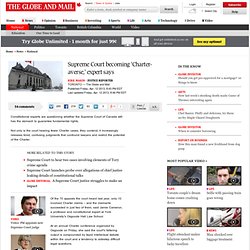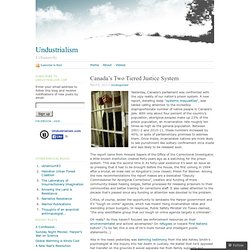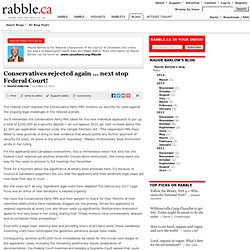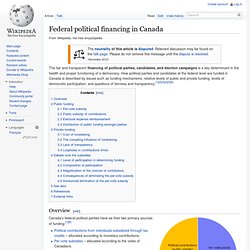

Supreme Court becoming ‘Charter-averse,’ expert says. Constitutional experts are questioning whether the Supreme Court of Canada still has the stomach to guarantee fundamental rights.

Not only is the court hearing fewer Charter cases, they contend, it increasingly releases timid, confusing judgments that confound lawyers and restrict the potential of the Charter. Of the 70 appeals the court heard last year, only 10 involved Charter claims – and the claimants succeeded in just two of them, said Jamie Cameron, a professor and constitutional expert at York University’s Osgoode Hall Law School. At an annual Charter conference organized by Osgoode on Friday, she said the court’s faltering output is compounded by tepid intellectual debate within the court and a tendency to sidestep difficult legal questions. Prof. Cameron said there wasn’t a single decision that stood out for “its importance, its foresight or its insights on the Charter and its protection of rights.”
Prof. “This court is becoming Charter-averse,” he added. Prof. In one case – R v. Landmark Lost Canadians citizenship case goes to court. The arguments to a landmark court case on Canadian citizenship have finally been filed today against Citizenship Minister Jason Kenney and the government of Canada.

The case, which deals with long-known but unresolved problems with citizenship law, could change Canadian history and potentially impact millions. At the heart of the issue are charter rights: do Canadians deserve the same rights, regardless of age, gender, birthplace or marital status? Is a Canadian born to an unwed mother less significant than one born to married parents? “This affects so many people who are being denied by CIC (Citizenship and Immigration Canada),” said Jackie Scott, who has been pushing for the last eight years to have her citizenship recognized.
Scott, the daughter of a Canadian WWII war veteran and British war bride, grew up in Canada and was raised to believe she was Canadian. For Scott, this was the final straw. Canada’s Two Tiered Justice System. Yesterday, Canada’s parliament was confronted with the ugly reality of our nation’s prison system.

A new report, detailing deep “systemic inequalities“, was tabled calling attention to the incredibly disproportionate number of native people in Canada’s jails. With only about four percent of the country’s population, aboriginal peoples make up 23% of the prison population, an incarceration rate roughly ten times as high as the general population. Between 2001-2 and 2010-11, these numbers increased by 40%, in spite of parliamentary promises to address them. Once inside, incarcerated natives are more likely to see punishment like solitary confinement once inside and less likely to be released soon.
Conservatives rejected again ... next stop Federal Court! The Federal Court rejected the Conservative Party MPs' motions on security for costs against the ongoing legal challenges in the robocall scandal.

You'll remember the Conservative Party MPs called for the nine individual applicants to put up a total of $260,409 as a security deposit -- an outrageous 3620 per cent increase above the $1,000 per application required under the Canada Elections Act. "The respondent MPs have failed to raise grounds or bring to bear evidence that would justify any further payment of security for costs, let alone in the amount requested," Madam Prothonotary Roza Aronovitch wrote in her ruling.
For the applicants and Canadians everywhere, this is tremendous news! Federal Court Upholds Hate Speech Provisions in the Canadian Human Rights Act. CPC Judiciary Contamination. On May 6, 2003, Richard Marceau introduced a Private Members’ Business motion to authorize the Standing Committee on Justice and Human Rights to study the process by which judges are appointed to Courts of Appeal and to the Supreme Court of Canada.

The following extracts are taken from debate on this motion. Richard Marceau (Bloc Québécois): There is an old principle in English common law, that justice must not only be done, it must be seen to be done. The purpose of this principle, the very foundation of our justice system, is to maintain the highest possible level of public confidence in the judiciary. The current process of appointing judges, however, is in direct conflict with this principle, and clouds the image of justice. There are many examples to support this statement. Quebec court rejects emergency injunction against Bill 78. Gabriel Nadeau-Dubois, legal experts weigh in. Got change?

Want change? Spare some and get some by becoming a member of rabble.ca today. Quebec Superior Court Chief Justice François Rolland on Wednesday rejected a motion filed by Quebec's student associations asking for an emergency injunction against certain elements of Quebec's contentious Bill 78. Federal political financing in Canada. The fair and transparent financing of political parties, candidates, and election campaigns is a key determinant in the health and proper functioning of a democracy.

How political parties and candidates at the federal level are funded in Canada is described by issues such as funding mechanisms, relative levels of public and private funding, levels of democratic participation, and questions of fairness and transparency.[1][2][3][4][5][6] Overview[edit] Canada's federal political parties have as their two primary sources of funding:[7][8] These two principal sources of funding primarily determine, along with loans and secondary revenue sources, how much money the federal political parties have available to spend.[7][9] BIG BLUE WAVE: Prominent SF gay-rights activist arrested on child porn charges. BIG BLUE WAVE: An examination of the gay gene in popular culture. BIG BLUE WAVE: Three Reasons Why Sexual Orientation is not like Race. Criminal Code. Emergencies Act.